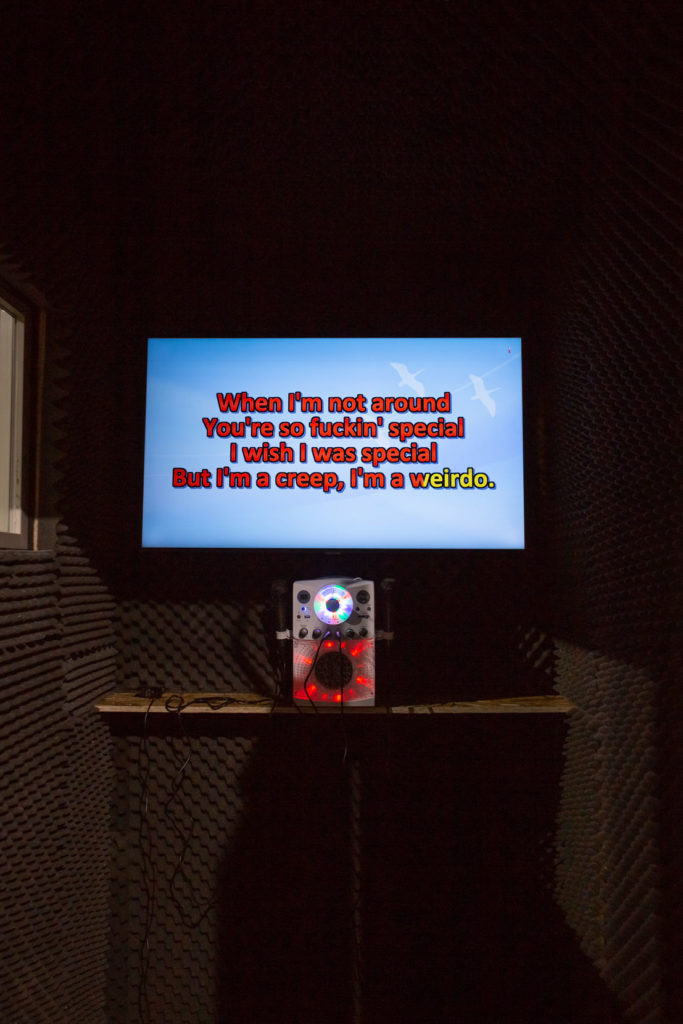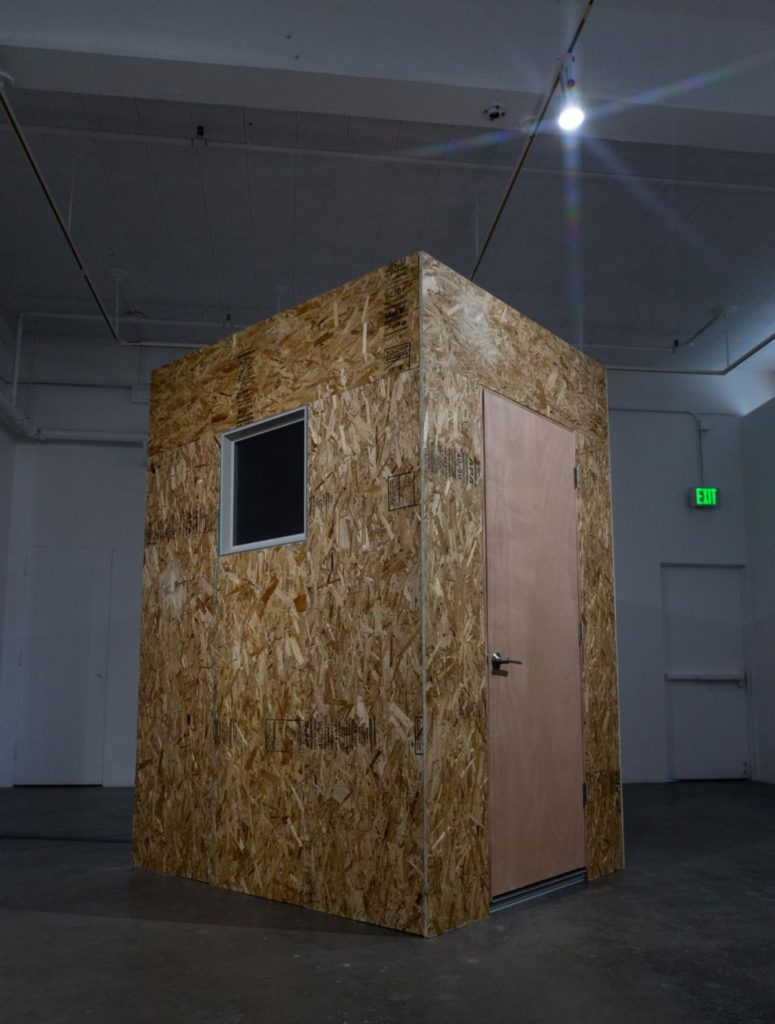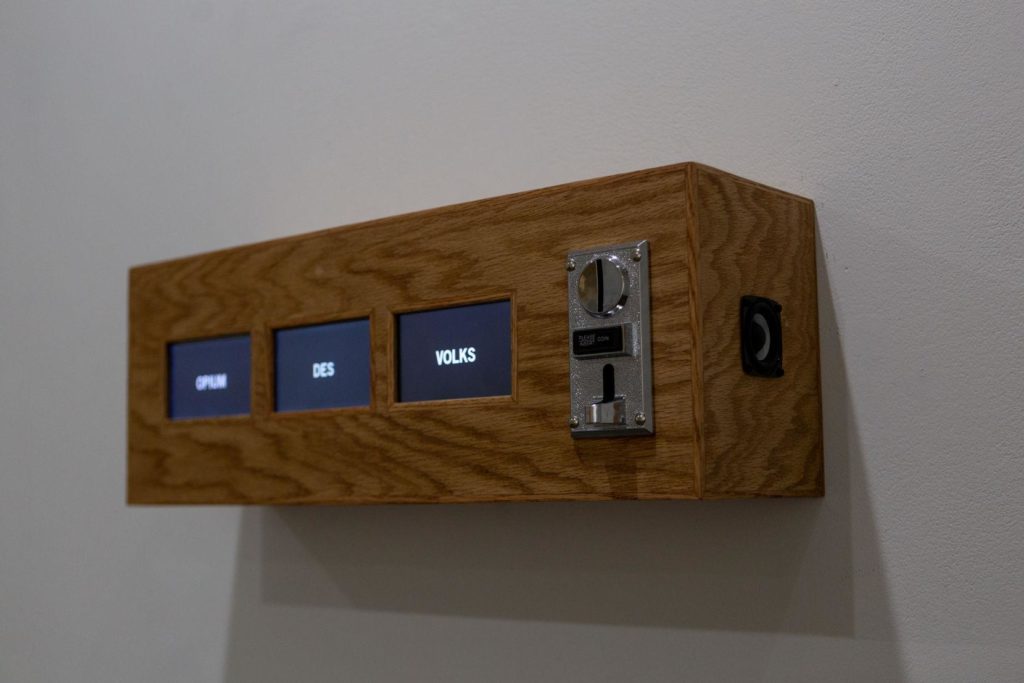Coupe’s ‘Exercises in Passivity’ explores our changing relationship with technology at the Jacob Lawrence Gallery
by Natalie Rand
The UW Daily, Aug 5, 2019

I am not a robot (2019): this metal cage contains a screen displaying questions designed by Cambridge Analytica to profile Facebook users and workers of corporations. Here, it asks a user the accuracy of the statement “I am always on time.”
A paid service to livestream your daily prayers. A karaoke booth with songs about being ignored with zero plays on SoundCloud. A CAPTCHA asking you to “select all images that make you afraid.” As technology advances and becomes even more integral to our daily lives, what will it mean in relation to the most fundamental elements of our humanity?
Seattle-based artist and DXARTS associate professor James Coupe explores these questions in his exhibition “Exercises in Passivity,” showing at the Jacob Lawrence Gallery Aug. 1 to 24.
Fitting for a university in Seattle, the exhibition makes a distinctive usage of Amazon paraphernalia, such as the “worker cage” and Mechanical Turk, to craft its message. Three Echo Dots mounted into the wall (the “Alexa, Stop” exhibit), laugh at random intervals, creating an uneasy feeling of having your ever-increasingly inferior humanity mocked by technology as you observe the other five exhibits.
Walking through the gallery, one gathers a sense of how advances in technology contribute to humanity’s increasing isolation.
“I am not a robot” features an Amazon worker cage with a screen inside displaying multiple-choice personality test questions used by Cambridge to profile Facebook users, creating a sense of being literally and metaphorically “boxed in” by technology.
 |
 |
|---|---|
| Zero Plays (2019): This single-person karaoke room heightens the emotion of already lonely music | |
“Zero Plays” is a karaoke booth that plays songs from SoundCloud with zero plays that are about being ignored. Its unfinished wooden exterior, according to Coupe, was meant to resemble the construction work of micro-apartments in Seattle due to the influx of Amazon workers, symbolizing how advancement has isolated people.
“Exercises in Passivity” also explores the changing meaning of what it means to be human.
“Let Us Pray” and “Time Clock” are screens displaying Amazon Mechanical Turk “crowdworkers” livestreaming everyday activities like praying, eating, and sitting around. According to Amazon’s website, “While computing technology continues to improve, there are still many things that people can do much more effectively than computers.” However, Coupe’s exhibit imagines a future where, as AI becomes smarter and more jobs are automated, people are forced to engage in the most fundamentally human activities for money.

Let Us Pray (2019): A box designed to collect coins that are later used to hire crowdworkers to record themselves engaging in spiritual practices.
“Completely Automated Public Turing test to tell Computers and Humans Apart” also explores this theme, and it is arguably the most compelling exhibit of all.
Every time we take a CAPTCHA test, not only are we verifying that we are human, but we are actually also training AI to recognize the images it asks us to recognize. For example, when you select all images of a stop sign, you are also inadvertently training the computer to recognize what a stop sign looks like. This creates a feedback loop where the more we try to prove our humanity, the harder it becomes to do so.
“CAPTCHA” captures the disturbing implications of this by imagining these CAPTCHA questions as trying to understand the deepest roots of human nature. A machine running on AI using Google’s CAPTCHA algorithm displays questions on a screen and automatically selects an answer. However, instead of asking to select all images of cars or bicycles, the AI asks questions such as “select all images with people that are egotistical” or “select all images that make you afraid” and selects from a variety of images ranging from stock-photo perfect to obscenely violent.
From isolation to entrapment to the changing definition of humanity, “Exercises in Passivity” examines how technology is shaping our destiny as humans. It’s a thought-provoking journey into the uncanny valley of the future that you won’t want to miss.
Reach writer Natalie Rand at arts@dailyuw.com. Twitter: @n_rand_